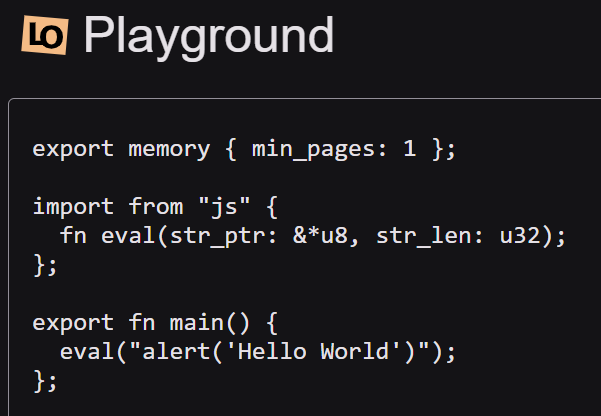Well it's been almost a year since the last dev log.
It's time to reveal what I was working on this whole time.
I definetely was not just too lazy to blog.
👄 New name
The old name was lole-lisp. Which stands for LOw LEvel LISP.
I decided to try chopping it in half and got lole.
I liked really liked chopping stuff in half so I did it again and got lo.
Chopping it in half again yielded L and O but both of them are existing programming languages 🤦. I know right, someone also likes chopping stuff.
So I backtracked a bit and stopped at lo. I like it. 👍
But because a bunch of fonts display l and 1 pretty much the same, the name will need to always be capitalized.
So that is the origin of:
And that 👆 is a new icon
🔥 New syntax
Old syntax was Lisp-like (s-exprs) because that's the simplest thing to parse and I thought that would also mean that's the simplest syntax there is.
S expressions are indeed simple and powerful. But you know what is even simpler and can express much more information that that?
It's binary. Yeah that binary: 01100001 01110011 01110011.
The thing is no matter how simple it is to parse S expressions, this process will only return S expressions, but now in a form of a tree instead of the text. You'll then need to parse them again and build your constructs like conditionals and function calls and stuff...
Hmm... So I though:
How about I just skip the step with a lot of parenthesss and only parse the minimum that is required to build the constructs.
😲 What a great idea.
So:
- I kept the core language.
- Added an optional flag to the top of the file that would switch from parsing
v1🤮 tov2😎. - Stole Rust's syntax. (literally)
- Rewrote all examples one by one, testing the new features as I went.
And that's how I got from this:
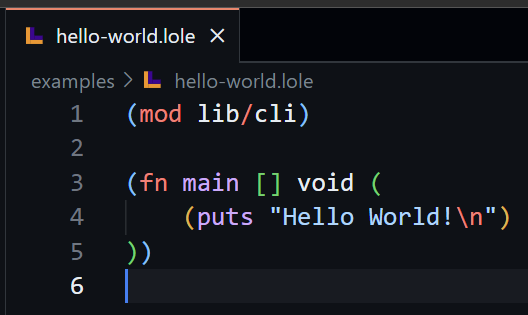
To this:
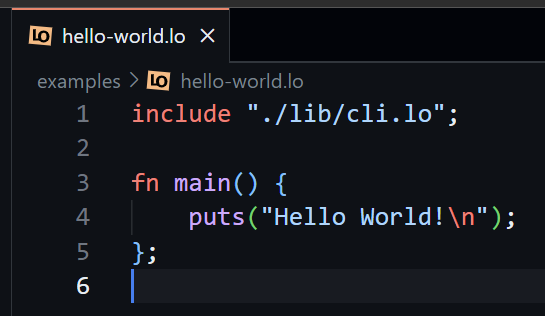
(the joke is that it's pretty much the same)
But when the code gets bigger then hello world you can clearly see the problem with v1:
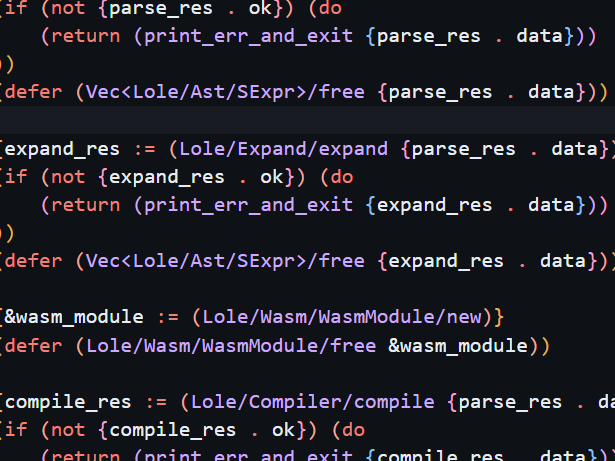
v1 syntax gets noisy very fast:
- using M expressions does help but it still requires constant juggling with parentheses and curlies.
- while reading it I was sometimes lost: it looked like a blob of something that required looking harder to understand what is going on
- it just isn't possible to have some constructs with S and M expressions (like method chaining)
And now a piece of v2 beauty:
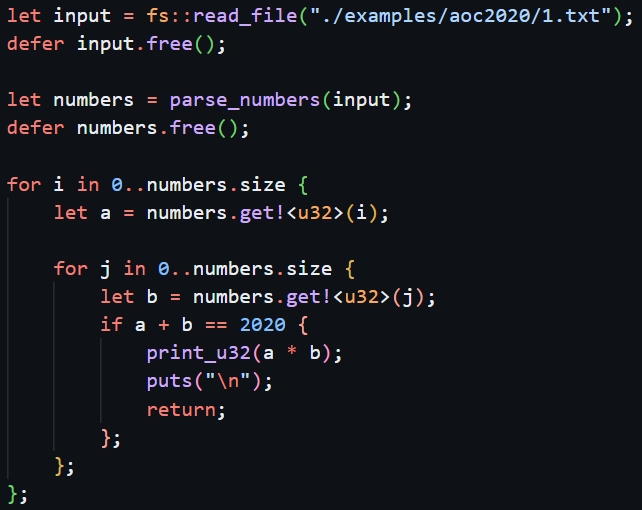
Comparision is apples to oranges (
rigged to trash v1) to show how I feel about the changes
🪄 Pratt parsing
Parsing the new syntax was actually very easy as well. It actually resulted in less code for parsing: from 3.6K to 3.4K lines (while having more features).
The reason behind is the use of a brilliant algorithm called Pratt Parsing.
I think a lot of people are just not aware of how simple parsing any language can be.
And not simple as in:
- I'll just
npm install super-parser(and wait for 3MB download).
But as in:
- Let's look up a refresher on how
Pratt Parsingworks and code the whole parser from scratch in 10 minutes in any language.
I might someday write about Pratt Parsing but for now here are some sources that I used:
🧰 New features
Changing the syntax was like a breath of fresh air.
Instead of worrying all the time to not make the code more unreadable (in v1) it allowed me to efforlessly add many useful features like: for loops, methods (with chaining), nested symbols, typed macros and first class error handling.
I don't yet have any docs showcasing the features (or any docs at all) but you can check the first 5 days of Advent of Code 2020 or standard library in the examples.
I only stole Rust's syntax highlighting grammar because it's kinda what I want the language to look like. I won't be adding any Rust features though, feature wise the language will be close to C / Go with basic syntax simillar to what modern languages (like TypeScript / Kotlin / Swift / Rust) have.
💡 LSP but no LSP
And I was oh 🤙 so 🤙 hyped 🤙 to implement the starter code assist in a week.
Here is the demo:
Because the only code target is WASM. I can just embed the whole compiler into VSCode extension (or any other IDE that can run WASM/WASI).
It does not require running a standalone language server and going through the complexities of JSON parsing and learning LSP protocol.
I just add the --inspect flag which will tell compiler to print all the info for code assist like this:
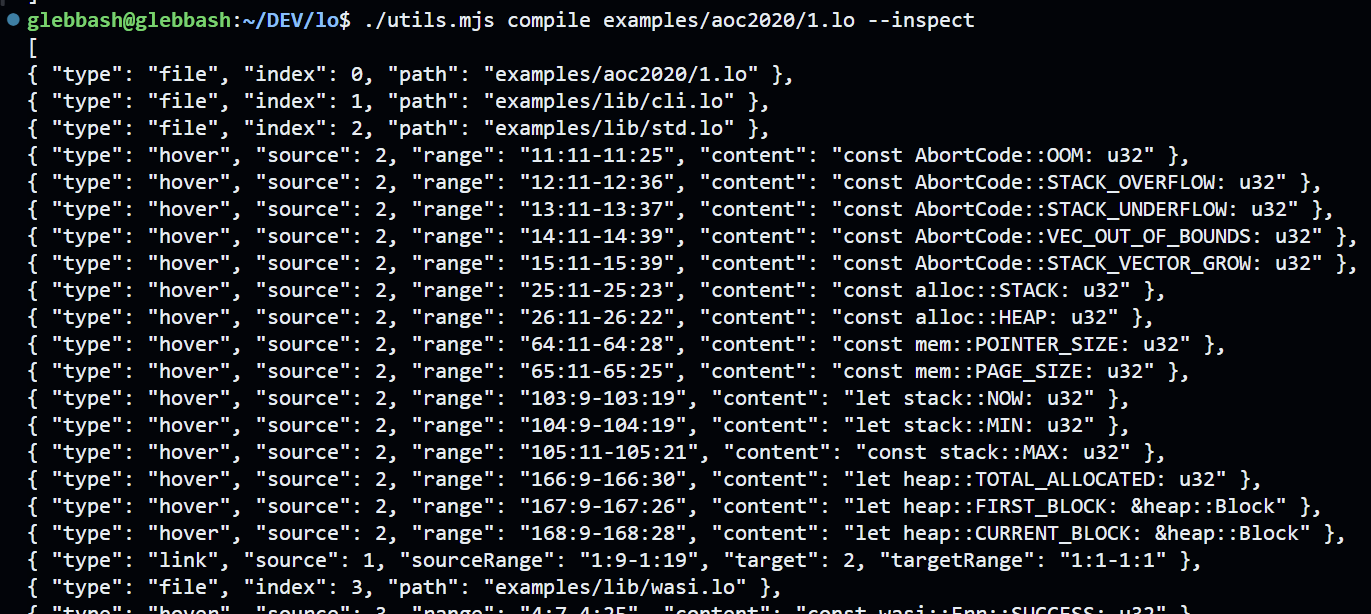
NOTE: This is a custom inspect log format to make it easy to adapt to VSCode APIs.
And then I just wire it up to VSCode APIs in ~300 lines of TypeScript.
You can check the full source of the extension here.
This might not be a final solution as it might have problems with big projects and I don't yet know if this can support autocomplete...
But for the amount of effort it took to implement the results are very nice 🤌.
🔮 The future
There were a lot of improvements that I am too lazy to write about as well.
But now, having:
- go-to and hover assists
- new poggers name and syntax
- and only 15 TODOs left in the whole project
I might finally be ready to start rewriting the compiler from Rust to LO to get to my ultimate goal of self-hosting.
🛝 P.S: Playground
Of fuck. I forgor a thing.
I also made a small playground to test that the compiler will work in the browser (for future usage in vscode.dev).
You can try it 👉 here 👈
